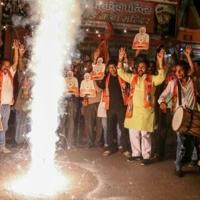Indian Prime Minister Narendra Modi was preparing to reveal his coalition government following a surprising election setback that cost his Hindu-nationalist party an overall majority.
His government’s 71 members took the oath of office after Modi, on Sunday, allocated 11 posts to coalition allies who demanded them in exchange for their support — five of which are in the top 30 cabinet positions.
In contrast to his previous two governments, where Muslim lawmakers were included, Modi’s third-term lineup does not feature any Muslim representatives.
During his ten years as prime minister, Modi has cultivated an image as a strong advocate for the country’s Hindu faith majority, causing concerns among minority groups, including the 200-million-plus Muslim population.
After being sworn into office, Modi posted on social media, stating, “Honoured to serve Bharat”, using the country’s name in Sanskrit, an ancient language from Hindu scriptures.
Following the election setback, Modi had to engage in quick negotiations with coalition partners in the National Democratic Alliance (NDA), who provided him with the necessary parliamentary numbers to govern with their 293 seats.
The specific portfolios assigned to each cabinet member have not yet been revealed, but Modi described his council of ministers as “a great blend of youth and experience”.
Reports from Indian media suggest that Modi will convene his first cabinet meeting on Monday evening, although no official confirmation has been provided.
– Old guard dominate –
The list is dominated by BJP old guard members, such as Rajnath Singh, Amit Shah, Nitin Gadkari, and Nirmala Sitharaman — who held the defense, interior, transport, and finance minister positions in Modi’s previous government.
Important BJP figure Jagat Prakash Nadda is also part of the cabinet.
Modi’s first action as Prime Minister following the election was to approve a cash handout for 93 million farmers, who form a crucial part of India’s workforce and economy.
Telugu Desam Party (TDP) from Andhra Pradesh and Janata Dal (United) from Bihar received two posts each in the cabinet, with TDP led by veteran politician Chandrababu Naidu and JD(U) led by Nitish Kumar.
Seven out of the 71 ministers are women, with two holding top cabinet positions.
Rahul Gandhi, Modi’s chief rival, was announced on Saturday to lead India’s opposition in parliament, after the Congress party nearly doubled its seat count, defying expectations.
While the opening date for parliament has not been set, Indian media reports suggest that the new session will begin next week, with the election of a speaker expected.
asv-bb-pjm/tym





